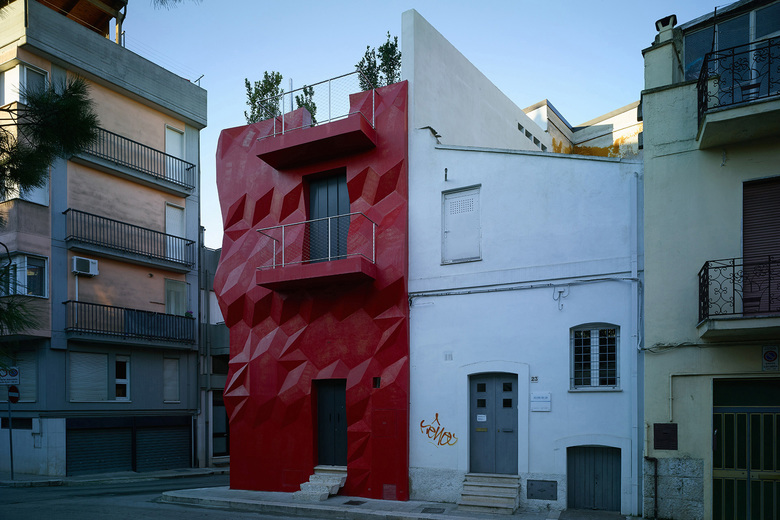Creative EIFS
John Hill
12. Februar 2016
Photo: Courtesy of GG-loop
GG-loop's renovation of a corner building in Altamura, Italy, features a bold, faceted red facade made from EIFS (Exterior Insulation and Finishing System), a system associated otherwise with bland, run-of-the-mill buildings.
Photo: Courtesy of GG-loop
The project goes by the name Gentle Genius, a fitting alliteration for architect Giacomo Garziano and his firm, GG-loop. Though based in Amsterdam, the building in southern Italy is home to Garziano's parents, who occupy it alongside a small office and a guest apartment for artists.
Before and after (Photos: Courtesy of GG-loop)
The refurbishment of the building focused on the 230-square-meter façade, partly with the aim of improving its energy efficiency (not a pressing concern, given the locale's Mediterranean climate). Given this brief, the choice of EIFS was a logical one, since its integral insulation provides greater energy efficiency than stucco alone, while also providing a similar appearance to the exterior material more commonly used in Italy.
Photo: Courtesy of GG-loop
Garziano created something that is far from the norm by supposedly tapping into Altamura's Genius Loci – the spirit of the place. He describes it musically, with his role as the conductor: "[Gentle Genius] sets a new key in the urban music score, recovering a deep note lost in time, reinventing local instruments to manifest as a sound from the future, allowing the Genius Loci to compose new music again." He also said that King Crimson's album In the Court of the Crimson King occupied his subconsciousness while designing the project.
Photo: Courtesy of GG-loop
Whatever the inspiration might have been, the effect of the façade gains as much character through its finish as through its folded form. The final resin coating applied to the coats of plaster and paint contains glittering particles that reflect the sunlight and call attention to the faceted surfaces.
Photo: Courtesy of GG-loop
A typical EIFS installation consists of an insulation board attached to a substrate, an integrally reinforced base coat, and a textured protective finish coat. Also known as ETICS (External Thermal Insulation Composite Systems) and EWIS (External Wall Insulation System), the system has thermal benefits, but it has downsides to consider: water infiltration and mold, fire protection (depending on the type of insulation used), and damage resulting from its softness. In regards to the last, it's common to see EIFS walls out of reach, located above brick and other stronger bases; here the faceted forms afforded by the EIFS are predomiantly above the ground floor.
Photo: Courtesy of GG-loop
Disadvantages aside, the system is gaining in popularity due to calls for improved thermal performance of building envelopes related to sustainable construction. Nevertheless, it is still not a beloved material due to applications that are cheap, speedy, and far from creative. GG-loop's Gentle Genius points the way to more artistic ways of using EIFS.
Elevations (Drawing: Courtesy of GG-loop)
English key for elevations, above:
A. Terrace floor of composite wood planks with integral benches and insulated tanks for vegetation
B. Metallic-painted galvanized steel structure for removable fabric sunshade
C. Existing wooden window frames replaced with triple-glazed, high-performance aluminum/wood windows (INTERNORM)
D. Existing wooden shutters replaced with aluminum shutters
E. Existing railings replaced with galvanized steel structure and metal mesh
F. Existing masonry openings fitted with new triple-glazed, high-performance aluminum/wood windows (INTERNORM)
G. EICS coating for increased thermal insulation (FASSA BORTOLO A50 system)
H. Existing wood door replaced with metal, security door with high thermal performance
I. Perimeter cavity for proper temperature and humidity insulation of the basement








